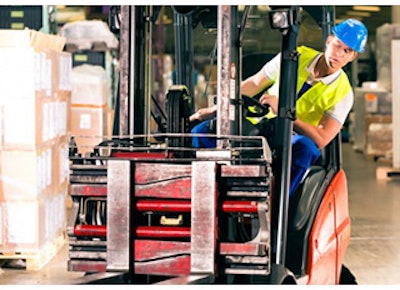
Even the best forklift operators are subjected to making common and routine mistakes. However, knowledge is power and mistakes create experience. Making a mistake with a forklift can provide drastic and dire consequences, so it is best to avoid these mishaps at all costs. Here are four common operator mistakes that are known to produce workplace incidents that could have been easily avoidable. Don’t make these mistakes, instead be aware of these potential errors and take action to prevent future accidents and incidents in any material handling operation.
Miscommunication
If you are operating a forklift, there are many methods of conveying intent. The most efficient method of communicating to employees and personnel is to use lights and signals when needed to alert oncoming traffic and nearby workers. If these devices do not work, it is best to not operate the machine. If you find yourself in a bind, convey intent with clear and concise verbal communication and hand signals. Second, ensure the backup alarm is working. A backup alarm alerts all in close proximity that the operator is backing up. This is even more essential when the operator may not be able to see an employee behind the forklift due to blind spots.
Failing to Check Hydraulic Fluid
This is another common blunder that can lead to disastrous consequences. Failing to check hydraulic fluid can lead to a failure in the machinery when lifting bulky or cumbersome goods. It is imperative to check hydraulic fluid before beginning operation as it can protect the safety and well-being of fellow employees and prevent damage to products and the forklift itself.
Forgetting to Check Gas and Battery
This is a fundamental task that is essential to assure that there is a limited chance of malfunction. How do forklifts run best? Make sure the device has adequate fuel and electricity. It is imperative to check both the fuel and voltage levels before operation. Failing to do so can result in severe consequences and ultimately result in collateral damage to goods or injury to personnel. Avoid a preventable catastrophe by checking the levels of both the gas and battery. The process is quick and easy, simply look for both gauges on the dashboard and assure that both are the appropriate industry-standard levels.
Trying To Do It All On Your Own
Forklift operation can be very difficult and lifting a heavy item can be even more painstaking! Do not be afraid to ask for a helping hand. Whether the help comes in the form of unloading a palate or some simple yet essential veteran advice in proper handling of the machinery, there is no such thing as a stupid question. If you are unsure or feel uncomfortable with any facet of forklift operation, be sure to ask any co-worker or supervisor for insights and instructions. Safety always comes first.
Tom Reddon is a Forklift Specialist and Blog Manager for National Forklift Exchange He also sits on the MHEDA Executive Dialogue team. Connect with him via Twitter at @TomReddon





















